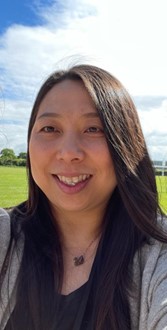May 31, 2023, by School of Medicine
A new adventure: designing eczema research as a citizen scientist.
The RAPID Eczema Trials team involves researchers, healthcare professionals and citizen scientists (people with eczema and parents of children with eczema) working together to answer important questions about eczema by designing and running clinical trials together. Our citizen scientist Kelly Zhang has shared her experience of being involved…
 Months ago, I was kindly invited to be involved in the citizen science work around eczema which was launched by a partnership of several Universities throughout the country, including the University of Nottingham, and joined the Rapid Eczema Trials Team together with eleven other public contributors.
Months ago, I was kindly invited to be involved in the citizen science work around eczema which was launched by a partnership of several Universities throughout the country, including the University of Nottingham, and joined the Rapid Eczema Trials Team together with eleven other public contributors.
At the very beginning, I was aiming to learn about the research procedure and outcomes on behalf of my family members who are suffering from mild to severe eczema as well helping to be the voice for people from Chinese communities (the charity I am working in is to support the wellbeing for the people from BAME communities). TBH, I wasn’t 100 percent sure about the obligation I should have with-in the team and thought that my opinions/suggestions could be only regarded as ‘side dishes’ for the research perspectives. However, my actual involvement was far more than my expectation since we, as a team, had at least 4/5 two-hour meetings for the discussions on the outline of the trial direction. Working alongside the researchers and professionals, we chose to do two trials (bathing frequency and the use of laundry products and adults and children are all included in the survey target groups).
Believe it or not, none of the citizen scientists are experts in research. We are ordinary people living with eczema all over the country. The only reason we got together and worked on the panel is the determination we must fight eczema.
The research needs the support of more people who, or whose family members, are living with eczema so as to figure out the possible trigger of non-drug aspects of living with eczema. We need to work together for our own wellbeing, especially people from ethnic communities. You are more than welcome to click the link below to join us in our community to support the trial or help out with the promotion. https://rapideczematrials.org/join-the-team
Let’s work together for our better health!
By Kelly Zhang (RAPID Eczema Trials citizen scientist), with input from Amanda Roberts (RAPID Eczema Trials citizen scientist & co-lead)
Simplified Chinese version
新的冒险:作为公民科学家设计湿疹研究
几个月前,我受邀参与由一系列大学合作伙伴发起的关于湿疹的公民科学参与工作,包括诺丁汉大学,并与其他11名公民贡献者一起加入了快速湿疹试验小组。
一开始,我的目标是代表我患有轻度至重度湿疹的家人了解研究过程和结果,并帮助华人社区发声,因为我工作的慈善机构是支持来自 少数族裔 社区的人们的福祉。 坦白说,我不是 100% 确定我在团队中应该承担的义务,并且认为我的意见/建议只能被视为研究观点的“配菜”。然而,我的实际参与远远超出了我的预期,因为我们作为一个团队至少有 4/5 次两小时的会议来讨论路径方向的轮廓。我们与研究人员和专业人士合作,选择进行两项试验(洗澡频率和洗衣产品的使用以及成人和儿童都包含在调查目标群体中)。
信不信由你,团队成员都不是研究专家,我们只是全国范围内患有湿疹的普通人。我们聚在一起并在小组中工作的唯一原因是我们必须与湿疹作斗争的决心。
该研究需要更多患有湿疹的人或其家庭成员的支持,希望找出湿疹的非药物方面的可能触发因素。为了我们自己的福祉,我们需要共同努力,尤其是少数族裔的人们。非常欢迎您单击下面的链接加入我们,以支持试验或帮助进行推广。 https://rapideczematrials.org/join-the-team
为了我们的健康,让我们一起努力吧!
Traditional Chinese version
新的冒險:作為公民科學家設計濕疹研究
幾個月前,我受邀參與由一系列大學合作夥伴發起的關於濕疹的公民科學參與工作,包括諾丁漢大學,並與其他11名公民貢獻者一起加入了快速濕疹試驗小組。
一開始,我的目標是代表我患有輕度至重度濕疹的家人了解研究過程和結果,並幫助華人社區發聲,因為我工作的慈善機構是支持來自 少數族裔 社區的人們的福祉。坦白說,我不是 100% 確定我在團隊中應該承擔的義務,並且認為我的意見/建議只能被視為研究觀點的“配菜”。然而,我的實際參與遠遠超出了我的預期,因為我們作為一個團隊至少有 4/5 次兩小時的會議來討論路徑方向的輪廓。我們與研究人員和專業人士合作,選擇進行兩項試驗(洗澡頻率和洗衣產品的使用以及成人和兒童都包含在調查目標群體中)。
信不信由你,團隊成員都不是研究專家,我們只是全國范圍內患有濕疹的普通人。我們聚在一起並在小組中工作的唯一原因是我們必須與濕疹作鬥爭的決心。
該研究需要更多患有濕疹的人或其家庭成員的支持,希望找出濕疹的非藥物方面的可能觸發因素。為了我們自己的福祉,我們需要共同努力,尤其是少數族裔的人們。非常歡迎您單擊下面的鏈接加入我們,以支持試驗或幫助進行推廣。 https://rapideczematrials.org/join-the-team
為了我們的健康,讓我們一起努力吧!
If you would like to find out more about RAPID Eczema Trials, please visit our website or email us on eczema@nottingham.ac.uk.
The RAPID Eczema Trials programme is sponsored by Nottingham University Hospitals NHS Trust and is funded by the National Institute for Health and Care Research (NIHR) under its Programme Grants for Applied Research programme (PGfAR NIHR203279). The views expressed are those of the author(s) and not necessarily those of the NIHR or the Department of Health and Social Care.
No comments yet, fill out a comment to be the first

Leave a Reply